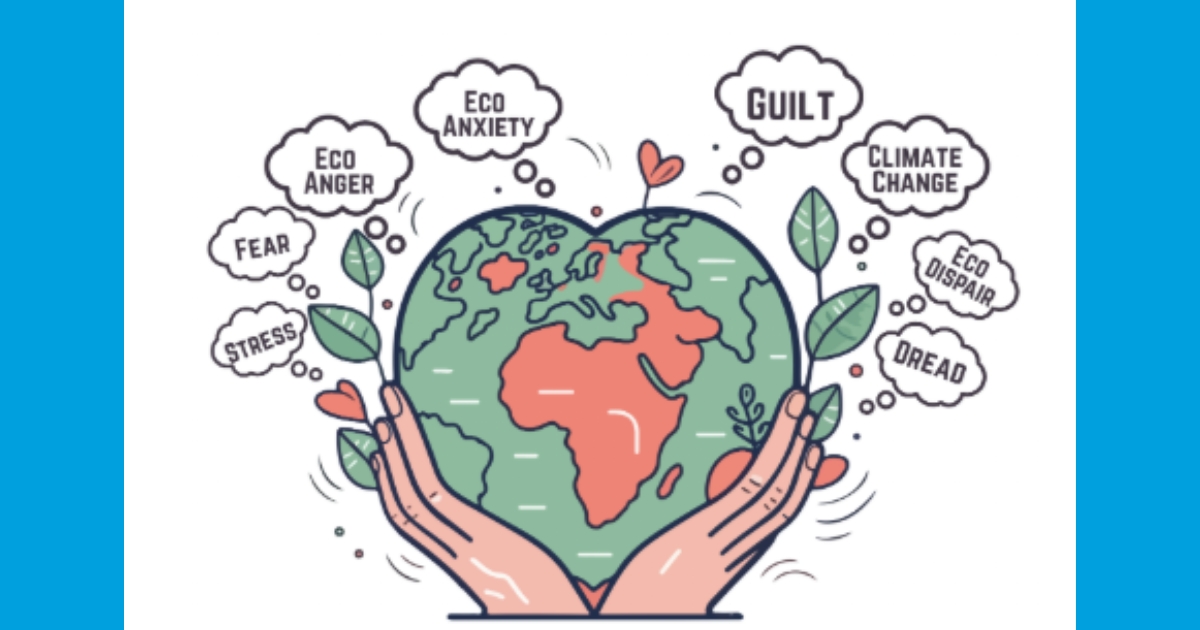
Fact Sheets And Publications

Eco-Anxiety:
Climate Change Impacting Youth Mental Well-Being
July 2025 | Written by: Megan Murtaugh
Introduction
As the effects of climate change become more prevalent in daily life, it is getting increasingly complex to avoid the topic coming up in conversations. As a society, we can physically feel and see its adverse impacts on our environment, and often hear about them at work, school, and on the news. As we delve into this long-term problem, it is essential to address how to stay properly educated about climate change while also taking care of our mental well-being.
What is Eco-Anxiety?
The increase in awareness and concern regarding climate change-related events has come with an increase in mental well-being problems for individuals.
For episodic events like wildfires, floods, or heat waves, individuals can experience elevated levels of stress, mood disorders and can even develop post-traumatic stress disorders. When exposed to these extreme weather events, between 25% and 50% of individuals will experience some degree of negative mental well-being, with some feelings diminishing over time.
For events that are more long-lasting, such as higher temperatures and rising sea levels, individuals often struggle with these existential threats. Climate change is a significant issue, and it can instill hopelessness in those who feel the solution to this problem is intangible. This mindset leads to anxiety.

Unlike many other mental well-being diagnoses, eco-anxiety does not start with a traumatic event. It stems from an overall awareness of climate change’s existence and impact. It creates this feeling of impending doom and helplessness. This feeling can lead to panic attacks, insomnia, and obsessive thinking.
Youth Distress Regarding Climate Change
As the discussion around tackling climate change has intensified in recent years, an increasing number of our younger generations feel that the burden falls on them. Roughly 85% of children show symptoms of eco-anxiety. A sense of fear surrounds climate change, while a sense of hope can help offset this feeling in young people. Exposure to climate change has significantly impacted the mental well-being of young people.
In addition to the stress youth feel, they tend to fight harder, giving hope to the rest of the world. Greta Thunberg is a notable example of a young climate activist who encourages others to take a stand and fight for their cause. After Thunberg protested the Swedish Parliament, millions of people began joining in strike action. She has remained a positive influence on the youth ever since.

Coping with Eco-Anxiety
Feeling eco-anxiety should not be viewed negatively; instead, it’s an emotional sign to respond and act on these fears. While not a diagnosable condition, there are multiple ways to manage eco-anxiety. As described in The Carbon Almanac, there are five sufficient steps to handle current and future eco-anxiety.
Acknowledgment
Individuals all over the world are experiencing eco-anxiety. Coming to terms with this will make you feel less alone in this battle. It is essential to understand your emotions and practice kindness towards yourself and others. Acknowledging that it's okay to feel this way is the first step toward feeling better.
Discussion
In addition to the fear of climate change, there is also the issue of people choosing not to talk about it. This could be some people’s way of coping with the facts, but for many experiencing eco-anxiety, talking about how you are feeling is a great way to relieve some stress. This discussion can help normalize feelings and focus your thoughts.
Since these conversations can be difficult, it is crucial to be considerate of your feelings and of the person you are speaking with. Asking comforting and helping questions will make everyone involved feel better. Simple questions, such as “What are you feeling?” and “What’s on your mind?” can help ease a person’s eco-anxiety.
Self Care
Taking care of yourself is crucial when experiencing the effects of eco-anxiety. There are three key ways to maintain a healthy mind and body while fighting these fears.
Quality sleep
Movement and exercise
Healthy eating habits
A lack of sleep can directly affect stress management throughout the day. A proper night’s sleep can result in a clear mind and positive attitude, diminishing the negative symptoms of eco-anxiety.
Along with keeping the mind healthy, maintaining a healthy body via exercise can also help fight stress. Planning to take daily walks and getting fresh air can significantly reduce feelings of stress.
Eating nutritious meals and drinking plenty of water can help boost energy levels and reduce stress. Combining all three of these recommendations can improve your ability to manage stress and cope with eco-anxiety.
As stated above, some eco-anxiety can lead to panic attacks, insomnia, and obsessive thinking. Deep breathing is an effective tactic to soothe panic attacks. Meditation and calming music can help with insomnia. The 5-4-3-2-1 method is suitable for obsessive thinking.
Support Systems
Dealing with these emotional and stressful times can be difficult, which is why it is essential to build strong connections with those around you and have a community filled with support. Talking to family and friends about what is on your mind is beneficial for reducing stress. Discussing climate change with those you trust will make you feel less alone.
Taking Action
One of the most effective ways to improve eco-anxiety is to take action. Staying up to date with climate news and getting involved in your local community can have a positive impact on mental well-being. Delaware provides public documents on how individuals can get involved, along with the state’s plan to fight climate change. Any actions you make can positively impact the long-term effects of climate change and decrease eco-anxiety in the short term.
Seeking Help
If you or a person you care for is experiencing symptoms of eco-anxiety and finds it to be interfering with your ability to work, study, or take care of yourself, professional help is always available. The University of Delaware offers 24/7 virtual mental well-being support for all enrolled students. Additionally, the Center for Counseling and Student Development Services offers individual and group counseling sessions. For more immediate concerns, dial 988 to reach the University of Delaware Suicide and Crisis Lifeline. For help outside of the university, dial 833-946-7333 for the Delaware Hope Line for free 24/7 coaching and support, or go to the Help is Here website for mental well-being support in Delaware…Additionally, dial 1-800-273-8255 for the US National Suicide Prevention Lifeline or text TALK to 741741 for free, anonymous 24/7 support from the Crisis Text Line.
References
Godin, Seth. The Carbon Almanac: It’s Not Too Late. Portfolio Penguin, 2022.
Eco‐anxiety in Youth: An Integrative Literature Review - Brophy - 2023 - International Journal of Mental Health Nursing - Wiley Online Library, https://onlinelibrary.wiley.com/doi/abs/10.1111/inm.13099. Accessed 26 June 2025.
Author links open overlay panelLawrence A Palinkas, et al. “Global Climate Change and Mental Health.” Current Opinion in Psychology, Elsevier, 2 July 2019, www.sciencedirect.com/science/article/pii/S2352250X19300661.
CANVA: Visual Suite for Everyone, www.canva.com/
About the Author
Megan Murtaugh, 2025 Extension Scholar, University of Delaware
Jennifer Volk (corresponding author), Associate Director, University of Delaware Cooperative Extension, Dover, DE (jennvolk@udel.edu)
About this Publication
Original Publication Date: July 2025
Peer Reviewers
Jennifer Seabrook-Scott, Mental Well-being Agent, University of Delaware Cooperative Extension
UD Cooperative Extension
This institution is an equal opportunity provider.
In accordance with Federal law and U.S. Department of Agriculture policy, Cooperative Extension is prohibited from discriminating on the basis of race, color, national origin, sex, age, or disability.
